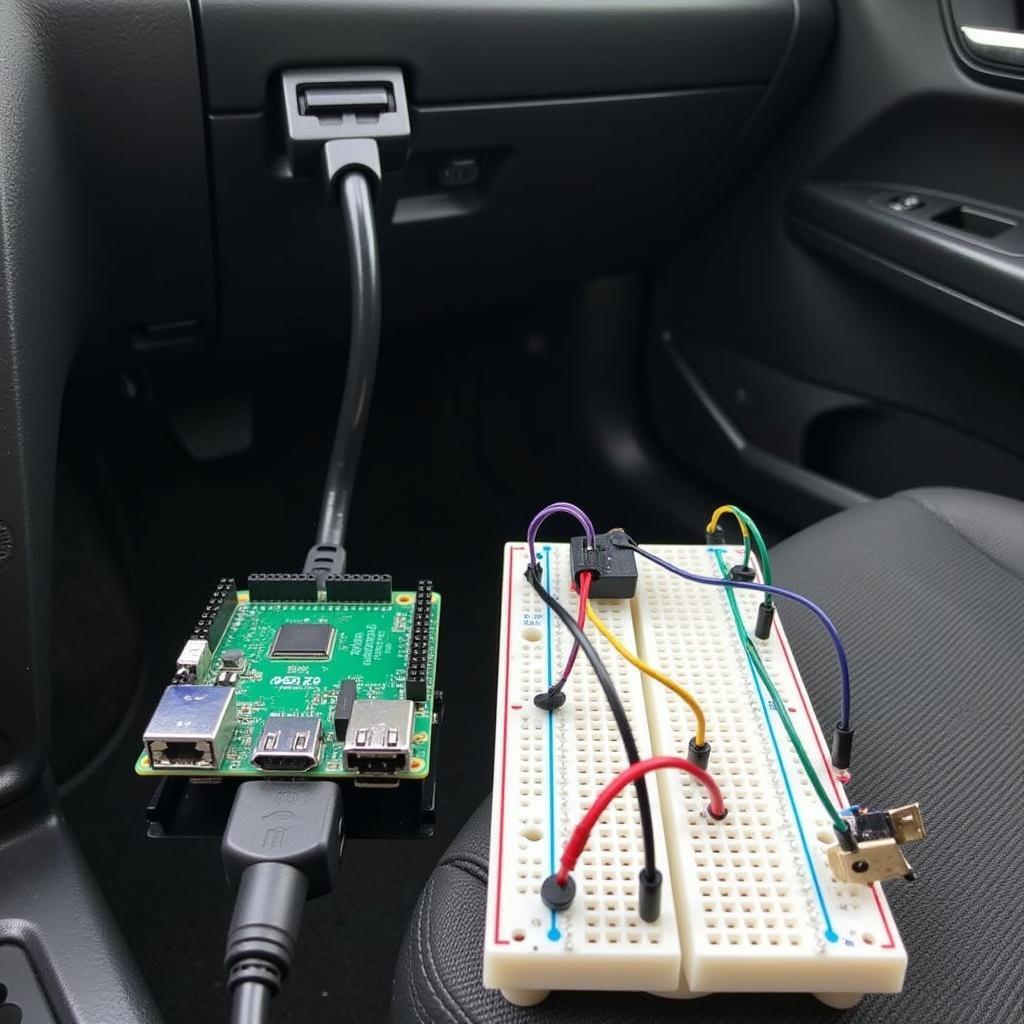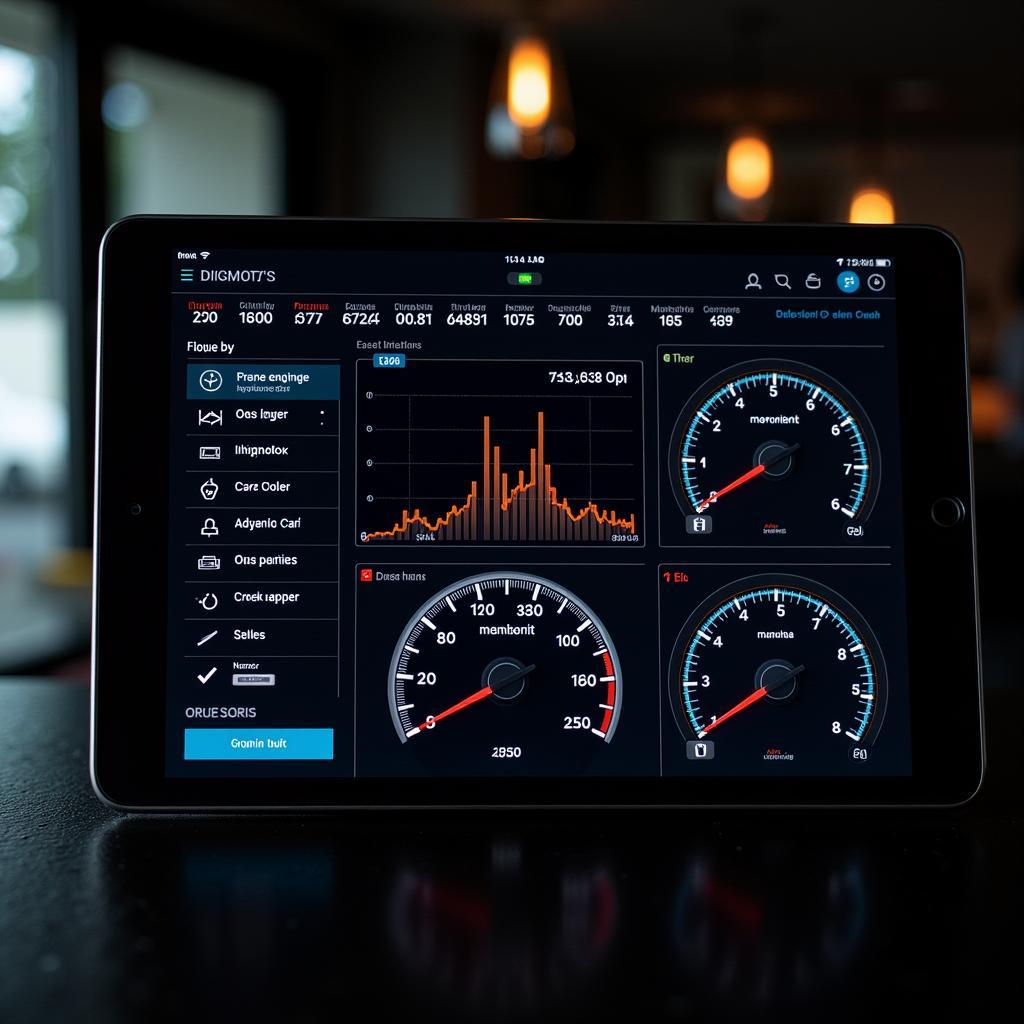The world of car diagnostics has taken a giant leap forward with DIY solutions like the Raspberry Pi Car Diagnostics Project. Imagine having a powerful, pocket-friendly tool at your fingertips that can demystify your car’s health with just a few clicks. This isn’t a scene from a sci-fi movie, it’s the reality of what you can achieve by transforming a Raspberry Pi into a sophisticated car diagnostics tool.
Why Choose Raspberry Pi for Car Diagnostics?
The beauty of the Raspberry Pi lies in its versatility. While this credit-card sized computer has made waves in fields like robotics and home automation, its application in car diagnostics is nothing short of revolutionary. But what makes it a car enthusiast’s best friend?
- Affordability: Compared to professional-grade OBD-II scanners that can cost a small fortune, the Raspberry Pi offers an incredibly budget-friendly alternative, without compromising on functionality.
- Customization: This is where the Raspberry Pi truly shines. You have the freedom to tailor the software and hardware to your specific needs. Want to monitor real-time engine data, track fuel efficiency, or even build your own custom dashboard? The possibilities are endless.
- Community Support: The Raspberry Pi boasts a vast and active community of makers and developers. This means you can tap into a wealth of knowledge, pre-built projects, and troubleshooting tips readily available online.
 Raspberry Pi OBD-II Setup
Raspberry Pi OBD-II Setup
Building Your Own Raspberry Pi Car Diagnostic Tool: A Step-by-Step Guide
Ready to embark on your DIY car diagnostics journey? Here’s a step-by-step guide to get you started:
-
Gather the Essentials:
- Raspberry Pi: A Raspberry Pi 3 or 4 is recommended for optimal performance.
- OBD-II Adapter: This acts as the bridge between your car and the Raspberry Pi. Look for a Bluetooth or WiFi enabled adapter for wireless connectivity.
- MicroSD Card: Choose a high-speed card with ample storage for your operating system and diagnostic software.
- Power Supply: A reliable power source for your Raspberry Pi is crucial.
- Peripherals: A monitor, keyboard, and mouse are needed for the initial setup.
-
Set Up Your Raspberry Pi:
- Download and install a compatible operating system like Raspberry Pi OS on your microSD card.
- Connect your Raspberry Pi to your monitor, keyboard, and mouse.
- Power on your Pi and follow the on-screen prompts to configure your operating system.
-
Install Diagnostic Software:
- There are numerous free and paid car diagnostic software options available. Popular choices include Torque Pro, OBD Fusion, and DashCommand.
- Download and install your chosen software from the Raspberry Pi app store or directly from the developer’s website.
-
Connect Your Raspberry Pi to Your Car:
- Locate your car’s OBD-II port, usually situated under the dashboard on the driver’s side.
- Plug in your OBD-II adapter to the port and ensure it’s securely connected.
-
Pair Your Devices:
- Depending on your chosen OBD-II adapter, you’ll need to pair it with your Raspberry Pi via Bluetooth or connect to its WiFi network.
-
Launch Your Diagnostic Software:
- Once your devices are successfully paired, open your diagnostic software.
- The software should automatically detect your car’s make and model and begin retrieving data.
-
Explore the World of Car Data:
- Congratulations! You’re now ready to access a wealth of information about your car’s performance.
- Monitor real-time engine data, read and clear diagnostic trouble codes, track fuel economy, and much more.
 Customizable Raspberry Pi Car Diagnostics Dashboard
Customizable Raspberry Pi Car Diagnostics Dashboard
Taking Your Project Further
The Raspberry Pi car diagnostics project is a gateway to a world of possibilities. Here are some ideas to take your project to the next level:
- Custom Dashboards: Design and build your own custom dashboards tailored to your specific needs using platforms like Freeboard or Cayenne.
- Data Logging: Log and analyze long-term data to track your car’s performance and identify potential issues before they escalate.
- Performance Monitoring: Monitor parameters like horsepower, torque, and acceleration to fine-tune your car’s performance.
- Remote Diagnostics: Access your car’s diagnostic data remotely from your smartphone or computer, even when you’re miles away.
Is a Raspberry Pi Car Diagnostics Project Right for You?
While a Raspberry Pi car diagnostics project offers an incredibly powerful and affordable solution, it’s important to consider if it aligns with your needs and technical expertise.
- Technical Inclination: Setting up and using a Raspberry Pi does require a certain level of technical proficiency. However, the abundance of online resources and the supportive community make it an achievable feat for even beginner hobbyists.
- DIY Enthusiasm: If you enjoy tinkering, problem-solving, and building custom solutions, then a Raspberry Pi car diagnostics project is right up your alley.
- Specific Requirements: Think about what you want to achieve with your diagnostic tool. Are you looking for basic code reading or more advanced features like data logging and custom dashboards?
Conclusion
A Raspberry Pi car diagnostics project is a game-changer for car enthusiasts and DIYers alike. It empowers you to take control of your car’s health, understand its inner workings, and potentially save on costly mechanic visits. With its affordability, customization options, and the support of a vast community, the Raspberry Pi proves that you don’t need to be a tech wizard to unlock the secrets under your car’s hood. So why wait? Embark on your Raspberry Pi car diagnostics adventure today!
FAQs
1. What is the best Raspberry Pi model for car diagnostics?
A Raspberry Pi 3 or 4 is recommended for their processing power and connectivity options.
2. Can I use a Raspberry Pi car diagnostics project on any car?
Most cars manufactured after 1996 are equipped with an OBD-II port, making them compatible with this project.
3. Is it legal to use a Raspberry Pi car diagnostics tool?
Yes, using a Raspberry Pi for car diagnostics is legal for personal use. However, it’s crucial to check local regulations regarding modifications to your car’s systems.
4. Where can I find more information about Raspberry Pi car diagnostics projects?
Numerous online resources, forums, and communities dedicated to Raspberry Pi and car diagnostics can provide further guidance and support.
5. What are some potential issues I might encounter with this project?
Common challenges include software compatibility issues, connectivity problems, and difficulties interpreting diagnostic data.
Need assistance with your car diagnostic journey? Don’t hesitate to reach out to our expert team via WhatsApp: +1(641)206-8880 or Email: [email protected]. We’re available 24/7 to provide personalized support and guidance.

Leave a Reply